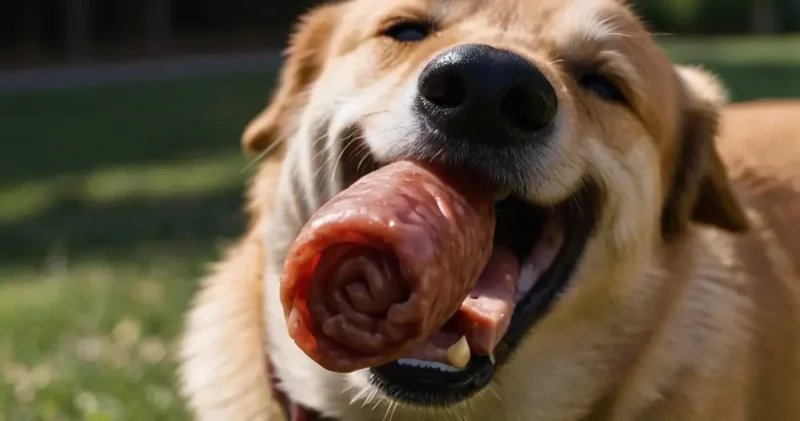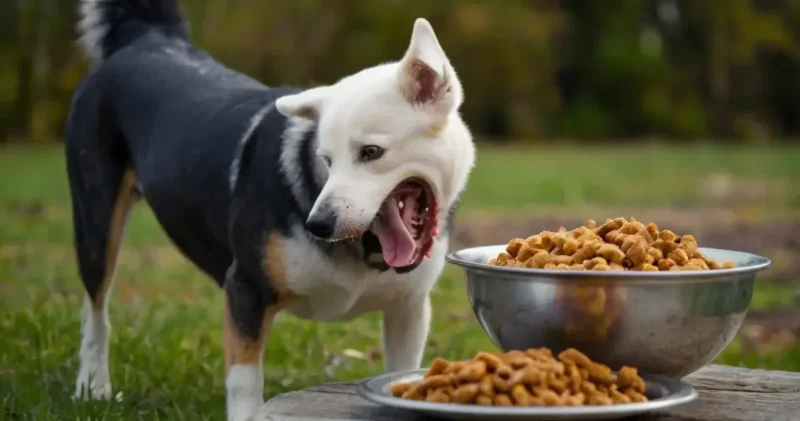
While dogs evolved to eat some fat, commercially available dog food caters to a more balanced diet. Bologna, though meaty, is too high in fat and sodium for regular consumption by dogs. This aligns with research showing dogs may prefer higher fat content than commercially available options, but moderation is key.
Now coming to the question “Can Dogs Eat Bologna?”, Yes dogs can have bologna in moderation but still it is not recommended. It do pose many serious threats to your dog’s health. To explore more on this topic, let’s get into this article.
What is Bologna?
Bologna Sausage is named after a city “Bologna” in northern Italy with roots from ancient times. It was famous for culinary contributions including cured Italian sausages named Mortadella which we call bologna today. In late 19th century Italian immigrants introduced Mortadella sausages which were later renamed as Bologna sausages.
Bologna sausages are typically cylindrical in shape and sliced into thin round pieces. A huge number of masses prepare them in a sandwich and eat is as a snack.
What is Bologna Made Up of?
You might have often had bologna burgers or sandwiches with the famous tangy sauce. But wondered what is this thin slice of pink meat made up of which we refer to as bologna. Bologna sausage is typically made from finely ground meat, usually pork, beef, or a combination of both. The meat is mixed with various spices, seasonings, and additives such as salt, pepper, sugar, garlic, and sometimes even other meats like poultry or veal. Additionally, ingredients like sodium nitrite are often used as preservatives and to give the meat its characteristic pink color.
The mixture is then stuffed into a casing, traditionally made from animal intestines, though synthetic casings are also used today. After stuffing, the sausage is usually cooked by smoking, boiling, or steaming.
We have already published a complete article on what types of pork meat can dogs eat. Here is a link to it.
CAN DOGS EAT PIG FEET AND OTHER PORK MEAT?
Can Dogs Eat Bologna?
Occasional treats of bologna in moderation might not be harmful for your dog and he may enjoy having them. Also, bologna contains protein, phosphorous, zinc and other vitamins that boosts up your dog’s energy levels and improve health. Besides this, it is rich in fats and sodium that can be a cause of serious health concerns i.e. blood sugar levels upset, cardiovascular issues and etc.
To answer in simplest terms, Bologna is a meal that is neither too toxic for your dog nor too good for his health. It’s better to stick to vet’s recommended diet plan as primary source of nutrient however you can seldom offer bologna to cheer up your dog’s mood.
Is Bologna Good for Your Dog?
Since dogs are omnivores and don’t primarily rely on meat as the only source of energy, Bologna might not prove to be much beneficial for dogs. However, it is prepared of pork meat which itself is rich in vitamins, it can offer following health benefits to your dog:
- Protein Source: Bologna is a source of protein, which is essential for building and repairing tissues, including muscles, skin, and organs. Adequate protein intake supports overall growth, development, and body function in dogs.
- Vitamins and minerals: Bologna contains vitamins and minerals such as vitamin B12, phosphorus, niacin (vitamin B3), and zinc. These nutrients play various roles in supporting canine health, including nerve function, bone health, energy metabolism, and immune function.
- Palatability: Dogs may find the taste and texture of bologna appealing, making it a useful option for enticing picky eaters to consume necessary medications or supplements when wrapped around them.
- Treats for Training: Due to its palatability, small pieces of bologna can be used as high-value treats during training sessions. This can help reinforce positive behaviors and strengthen the bond between dogs and their owners.
To buy bologna at the cheapest rates, you can visit the link below or click at the image below:
Is Bologna Bad for Your Dog?
As bologna sausages contains fats and sodium, plus they are prepared with spices and other additives, they are not fit for your dog’s health. They can pose a number of health issues to your dog if fed in excess. Here are some common health concerns:

- Obesity: Bologna is high in fat and calories, which can lead to obesity in dogs if consumed excessively. Obesity can trigger to a range of health issues, including joint pain, diabetes, and heart disease.
- Pancreatitis: The high fat content in bologna can trigger pancreatitis in dogs, an inflammation of the pancreas. Pancreatitis can cause severe abdominal pain, vomiting, diarrhea, and in severe cases, can be life-threatening.
- Gastrointestinal Upset: Bologna, especially if seasoned or processed with additives, can cause digestive upset in dogs. This may include symptoms such as diarrhea, vomiting, gas, and bloating.
- Salt Toxicity: Bologna is often high in sodium, which can lead to salt toxicity (hypernatremia) in dogs if consumed excessively. Symptoms of salt toxicity include excessive thirst, vomiting, diarrhea, tremors, seizures, and in severe cases, death.
- Nutritional Imbalance: While bologna contains protein and some vitamins and minerals, it is not a complete and balanced diet for dogs. Feeding bologna as a significant portion of a dog’s diet without proper supplementation can lead to nutritional deficiencies over time.
- Increased Risk of Cancer: Processed meats like bologna have been associated with an increased risk of certain cancers in humans. While direct evidence in dogs is limited, it’s prudent to minimize the intake of processed meats to reduce any potential risk.
Sharing my personal experience: Last month I was craving for bologna sandwiches. I decided to get it from the café near my house but made a mistake that I went along my dog. There my dog started behaving weird just for the sake of a sandwich so I ordered four, two for me and two for my dog. After 6 hours of return from café, I discovered that my dog is suffering diarrhea. This little fun turned into a headache for me. To save you guys, I would personally advice to be aware of right quantities your dog can consume.
Can Dogs Eat Fresh Bologna
It’s better to serve your dog with fresh bologna rather than other types of bolognas. Fresh bologna is free from all kind of additives and is free from all seasonings found in processed varieties. It still poses similar health risks due to its high fat, salt content, and potential allergenic ingredients but the chances are less. Thus, it should also be fed to dogs cautiously and in moderation.
Can Dogs Eat Raw Bologna
Feeding raw bologna to dogs is not recommended. Raw meats, including raw bologna, pose several risks to canine health, including bacterial contamination and potential exposure to parasites.
Raw meats can contain harmful bacteria such as Salmonella, E. coli, and Listeria, which can cause foodborne illness in dogs. These bacteria can lead to symptoms such as
- Vomiting
- Diarrhea
- Fever
- Lethargy
- Dehydration
In severe cases, foodborne illnesses can be life-threatening, especially for puppies, senior dogs, or those with weakened immune systems.
Additionally, raw meats, including bologna, may harbor parasites such as Toxoplasma gondii or Trichinella spiralis, which can infect dogs and cause serious health problems. Cooking meats to a proper temperature kills these parasites and reduces the risk of infection.
Can Dogs Eat Baked Bologna
Baked bologna is generally safer for dogs to consume compared to raw bologna because the cooking process helps eliminate harmful bacteria and parasites. However, while small amounts of baked bologna may be safe as an occasional treat for some dogs, it’s important to consider several factors before offering it to your pet.
Here are some considerations regarding baked bologna for dogs:
- Moderation: Baked bologna should be given to dogs in moderation. While cooking reduces the risk of bacterial contamination, bologna is still high in fat and sodium, which can lead to health issues such as obesity, pancreatitis, and salt toxicity if consumed excessively.
- Portion Control: Limit the portion size of baked bologna to prevent overfeeding and to avoid exceeding your dog’s daily caloric and nutritional requirements.
- Ingredients: Choose plain, unseasoned bologna without added spices, seasonings, or preservatives that may be harmful to dogs. Check the label for any ingredients that could be toxic or allergenic to your pet.
Can Dogs Eat Fried Bologna
Feeding fried bologna to dogs is not recommended. Fried foods, including fried bologna, are typically high in fat, calories, and potentially harmful substances resulting from the cooking process, which can pose several health risks to dogs.
Here are some reasons why dogs should not eat fried bologna:
- High Fat Content: Frying bologna increases its fat content significantly, which can contribute to obesity and pancreatitis in dogs if consumed excessively. To explore side effects of high fat diet on dogs, you can click here.
- High Sodium Content: Fried bologna often contains added salt, and the frying process can further increase its sodium content. Excessive sodium intake can lead to salt toxicity (hypernatremia) in dogs, causing symptoms such as excessive thirst, vomiting, diarrhea, and in severe cases, seizures or death.
- Potential Toxins: Frying bologna at high temperatures can produce potentially harmful substances such as acrylamide, advanced glycation end products (AGEs), and trans fats, which may increase the risk of inflammation, oxidative stress, and chronic diseases in dogs.
Other Types of Bolognas for Dogs
There is not only traditional pork bologna but are some other kinds of bologna prepared with different kinds of meat and additives. Let’s check if they are good for your dog or not:
Traditional Bologna (Pork or Beef):
Dogs can eat traditional bologna in moderation. However, it should be plain, without added spices, seasonings, or excessive salt content. The high-fat content should be considered, and it should not be a staple in a dog’s diet due to its calorie density.
Caution: Watch for potential allergic reactions or digestive upset, and limit the portion size to avoid excessive fat and sodium intake.
To explore can dogs eat cow hooves, you can click here.
Turkey Bologna:
Turkey bologna can be a lower-fat alternative to traditional pork or beef bologna for dogs. It should still be plain and free from added spices or seasonings.
Caution: While lower in fat, it still contains sodium, so moderation is key. Monitor for any adverse reactions.
Chicken Bologna:
Similar to turkey bologna, chicken bologna can be a leaner option for dogs. It should be plain and devoid of added spices or seasonings.
Caution: Dogs with poultry allergies should avoid chicken bologna. Monitor for any allergic reactions or digestive issues.
Beef Bologna:
Beef bologna can be suitable for dogs, particularly those with sensitivities to pork or poultry. It should be plain and free from added seasonings.
Caution: Monitor for any allergic reactions or digestive issues, and ensure moderation due to the fat content.
Vegetarian or Vegan Bologna:
Vegetarian or vegan bologna made from plant-based ingredients can be an option for dogs with meat sensitivities or allergies. It should be free from harmful additives or seasonings. In my personal opinion, this is the best kind of bologna that your dog should eat.
Caution: Ensure that the ingredients are safe for dogs and monitor for any digestive upset. Additional supplementation may be necessary to meet nutritional needs.
To explore, how to cook vegan bologna, you can click here.
How Much Bologna Can Dogs Eat?
Feeding bologna to dogs should be done in moderation, if at all, due to its high fat and sodium content, which can be harmful to dogs’ health in excess. If you choose to give your dog bologna as an occasional treat, it’s important to consider their age and size. Here’s a breakdown by age range:
-
Puppies (up to 1 year old): Puppies have sensitive digestive systems and are still growing rapidly, so their diet should primarily consist of a high-quality puppy food formulated to meet their nutritional needs. Introducing processed meats like bologna at this age is not recommended. It can upset their stomach and may lead to long-term health issues.
-
Adult dogs (1 year to 7 years old): For adult dogs, occasional small amounts of bologna as a treat may be okay, but it should not exceed 10% of their total daily caloric intake. Be mindful of the dog’s overall diet and ensure that the bologna is free from additives like garlic, onion, and excessive seasoning, which can be harmful to dogs.
-
Senior dogs (7 years and older): Senior dogs may have more sensitive digestive systems and may be more prone to health issues such as obesity, heart problems, and kidney issues. It’s best to avoid feeding them bologna altogether or limit it to extremely rare occasions.
Alternatives to Bologna for Dogs
Switching to alternatives of bologna is a better option due to the number of health issues bologna might pose to your dog. Here are a few alternatives that are good for your dog’s health and are similar in taste:
| SR.NO | ALTERNATIVE | DETAIL |
|---|---|---|
| 1. | Plain Cooked Meets | Offer plain cooked meats such as boiled chicken, turkey, beef, or pork without any added seasonings or spices. These meats can provide a savory taste similar to bologna and are generally well-received by dogs. |
| 2. | Natural Jerky Treats | Look for natural jerky treats specifically made for dogs, preferably with single-ingredient options like chicken, beef, turkey, or fish. These treats often have a chewy texture and concentrated flavor that dogs enjoy. |
| 3. | Freeze Dried Meats | Freeze-dried meat treats made from real meat or fish can offer a similar taste experience to bologna. These treats are lightweight, crunchy, and retain much of the natural flavor of the meat. |
To explore more other foods that can dogs can either eat or not, click here.
What are the Three Most Toxic Meats for Dogs?
While many kind of meats are good for dogs but still there are a few that possess the risk of food poisoning and other serious diseases. Let’s explore them:
-
Raw Pork: Raw pork can harbor the parasite Trichinella spiralis, which can cause Trichinellosis in dogs if ingested. This parasite can lead to vomiting, diarrhea, muscle pain, fever, and in severe cases, respiratory or neurological issues. Additionally, raw pork may contain harmful bacteria like Salmonella and E. coli, which can cause food poisoning in dogs.
-
Cooked Chicken Bones: Cooked chicken bones, particularly those from cooked poultry, can splinter easily when chewed by dogs, posing a significant choking hazard or causing internal injuries such as punctures or obstructions in the digestive tract. It’s essential to never feed cooked bones of any kind to dogs, as they can cause serious harm.
-
Processed Meats: Processed meats like bacon, sausage, and deli meats are often high in salt, preservatives, and other additives, which can be harmful to dogs. Excessive consumption of these meats can lead to conditions like pancreatitis, which is inflammation of the pancreas, as well as obesity and cardiovascular issues. Moreover, the high fat content in some processed meats can also contribute to pancreatitis and other gastrointestinal issues in dogs.
Still you can feed processed meat in small amounts to your dog but do remember it should be free from all seasonal additives and prepared in minor salt since dogs are much more sensitive to salt than humans.
Conclusion
I must end with the famous quote, “You Are What You Eat.” In short, to stay healthy both humans and animals should stick to diets that are beneficial for their health and doesn’t exhibit any adverse effects. In case of bologna, it offers both health benefits and disasters but you can maintain a balance between them just by sticking to a moderate quantity. Your dogs can eat cooked bologna but in moderation only.
We have also published articles on topics, Can dogs drink vitamin water? AND Can dogs eat orange chicken? You can visit them.
FREQUENTLY ASKED QUESTIONS
Can dogs eat tapioca? 4 secret benefits








1 thought on “Can Dogs Eat Bologna? A mystery Revealed”